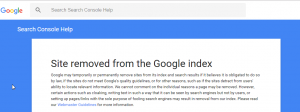Your online reputation is incredibly valuable to you (if not to other people), so Canada’s Privacy Commissioner says monetary penalties are needed when fake news about you can’t be easily removed from a website or search engine.

Canadians can complain – but that is about all right now – to the Privacy Commissioner if a matter concerning defamatory online content cannot be resolved through existing customer complaints channels.
The intent is not to use heavy-handed methods as a first resort, but if search engine and website managers do not appropriately respond to customer complaints or if they fail to carefully assess requests from individuals that certain information be taken down, the Privacy Commissioner says tough enforceable orders backed by stiff financial penalties are needed.
That’s not an option right now.
The Office of the Privacy Commissioner of Canada underscores in a draft position paper about Online Reputation that Canada’s federal private sector privacy law – PIPEDA – does provide for a right to ask search engines to de-index links to (and ask websites to remove or amend) inaccurate, incomplete or outdated information.
And if a matter cannot be resolved through existing customer complaints channels, individuals do have a right to complain to the Office of the Privacy Commissioner of Canada.
But in correspondence with WhatsYourTech.ca, the OPC noted that it has “called for both the ability to make orders and to issue monetary penalties” saying “further powers would need to be exercised” in cases of non-cooperation.
The type of personal information someone might want to be de-indexed or taken down is well, rather broad: from social ratings sites and revenge porn postings to arrest citations and mugshots to nasty student reports about their teachers.
The OPC cites examples such as an adult who feels their reputation is harmed by controversial views they posted as a teenager, or pictures of a minor who later feels they could jeopardize employment or advancement opportunities. Other examples could include defamatory content in a blog; personal, intimate photos being posted without consent; even online information about someone’s religion, mental health or marital status could be highly sensitive reputational information.
“[P]rotecting reputation is increasingly difficult in the digital age,” Therrien described when releasing the privacy proposals, “where so much about us is systematically indexed, accessed and shared with just a few keystrokes. Online information about us can easily be distorted or taken out of context and it is often extremely difficult to remove.”
In fact, the OPC says it’s possible that the number of take-down requests in Canada may hit the “hundreds of thousands”.
There are existing defamation laws in Canada and actions that can be taken in the case of libel or slander. But the Privacy Commissioner’s office feels it is reasonable to have multiple remedies available; rather than supersede or replace defamation law, PIPEDA should work alongside it.
Privacy Commissioner Daniel Therrien also noted that “[w]hile it’s important to take action on de-indexing, we are also recommending that Parliament undertake a study of this issue. Elected officials should confirm the right balance between privacy and freedom of expression in our democratic society”.
Indeed, there are concerns that an increased ability to call for and issue website content take-down orders will lead not to fewer instances of defamation, but to more cases of censorship. Legal and legitimate content should be protected with as much legal muscle as an individual’s reputation, perhaps more so.
One way the public can monitor the nature of de-indexing and take-down requests is through curated and searchable collections of such orders. The Lumen database, for example, collects and analyzes requests to remove online materials content, and so Internet users and researchers can study the source of content removal requests and the perceived threats that triggered them.
And with our considered input, elected representatives in Parliament could strengthen online privacy protection and freedom of expression at the same time. The Office of the Privacy Commissioner is “consulting with stakeholders” and calling for feedback on its report through mid-April this year, so interested parties have an opportunity to affect the legislative process.
Privacy Protection Needs Privacy Education
The Privacy Commissioner and his report also emphasized the importance of privacy education in the fight for privacy protection.

“[P]rotecting reputation is increasingly difficult in the digital age,” Privacy Commissioner Daniel Therrien described when releasing the privacy proposals, “where so much about us is systematically indexed, accessed and shared with just a few keystrokes.” Illustrative image of a computer Creative Commons BY-SA HackNY, Flickr.
“Privacy education should serve to develop good online citizens,” his office wrote to WhatsYourTech; people should be armed with “the technical knowledge of how to protect themselves and a strong sense of how and why it is important to act responsibly online. Privacy education should emphasize the importance of thinking about the potential impacts of one’s actions on others.”
In today’s era of fake news, fake friends, fake bots and fake posts, we must all realize that information about a person that’s posted and found online does not necessarily present a complete picture of who that person is.
It’s important not to judge a book by its cover, or a person by their online profile.
-30-




